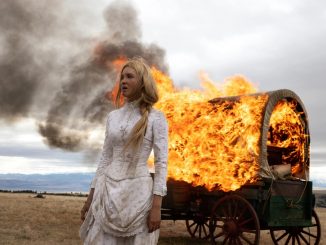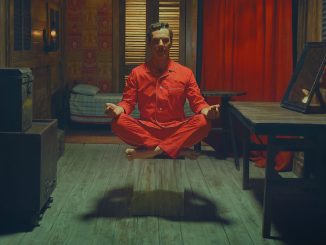
I’m always interested in learning who and what wins the Oscars, but I probably won’t be watching much of the televised ceremony, again, this year (March 12). That’s a reflection of my indifference toward the ceremonial ministrations themselves rather than the nominated films, there’s always some indifference there, too.
I do have some curiosity about what happens with the new German remake of All Quiet on the Western Front. It has already won big with the British equivalent of the Oscars (BAFTA), and it received several Oscar nominations, including Best Picture and Best International Film. For me, it’s not nearly the best in either category. It is an impressive production, but not a particularly good movie. It’s a respectful adaptation of the classic Erich Maria Remarque novel, but even then only as a live action cartoon with a big budget and a load of caricatures and cliches.
In To Leslie, Andrea Riseborough, the semi-controversial nominee for Best Actress, does deliver a boldly immersive performance as an aging, alcoholic party girl. The movie’s best acting is in scenes that pair her character with the males in her life—her son (Owen Teague), an anguished and contentious relative (Stephen Root), and the motel owner (Marc Maron) who tries to help her redeem herself. She’s good, but no match for Cate Blanchett in Tár.
Le Pupille, nominated for Best Live Action Short, is a 37-minute masterpiece from Italy. It’s directed by the esteemed Alice Rohrwacher (and funded by Disney!), and the cast includes two major stars, Valeria Bruni Tedeschi and the director’s sister, Alba. But it’s best described as a fresh, stylish musical comedy centered on some rambunctious little girls in a Catholic boarding school, at Christmas time, circa 1940.
Close, a Best International Film nominee from Belgium, is a small but quite brilliant film about the intense, doomed friendship between two 13-year old boys, and the emerging relationship of the one boy and the other boy’s mother after tragedy strikes. The drama is subtle and intimate throughout, and it culminates in powerfully emotional moments in which almost no words are spoken.
The nominations pay homage to Stephen Spielberg’s The Fabelmans, but ignore another auteur’s quasi-autobiographical coming-of-age story and period piece—James Gray’s Armageddon Time. Gray’s film can’t match the bright performances and flashy entertainment of Spielberg’s film, but his pungently detailed family drama has a gravity and a richness that ought to have gotten greater recognition than it has so far. Best original screenplay, maybe?

Alice Diop’s French language drama, Saint Omer, was shortlisted for Best International Film, but didn’t make the cut. It’s partly an offbeat courtroom drama, but ultimately it revolves around the fraught but mostly unspoken relationship between Rama, a writer and teacher of Senegalese descent, and Laurence, a Senegalese immigrant and student charged with murder for the death of her 2-year-old daughter. The courtroom is in the French town of Saint Omer, but the emerging drama is a richly intriguing tangle of immigrant heritage and assimilation, mixed-race relationships, and the dynamics of mother-daughter bonds. In a way, it is a closet drama, but it has a large reach, emotionally and intellectually.
A great non-Oscar pleasure of recent weeks has been the Poker Face TV series on Peacock. Charmingly raucous Natasha Lyonne plays a rough-and-ready working gal whose journey through a series of odd jobs keeps bringing her into the vicinity of major crimes on which her uncanny skills of observation will be brought to bear. Her character Charlie Cale’s preternatural ability to detect falsehoods (or, in her words, “bullshit”) contributed to so much success as a poker player that she’s now persona non grata in major casinos—hence her peripatetic career of odd jobs and volunteer crime-solving. The eight hour-long episodes in season one always begin with commitment of a crime, then shift gears to show Charlie getting drawn from the margins of the case and on toward the heart of the matter. Lyonne makes such an enchantingly brash heroine that I’m moved to binge, finally, on her previous series, the much-admired Russian Doll (Netflix).




Mr Selznick, I like your work, and I’m sorry that no one caught the obvious small-but-quite-brilliant typo in your Oscar piece. The notion that size usually correlates with brilliance clearly can’t have been what you meant to imply. It probably won’t happen again.